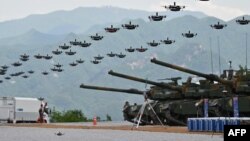Washington and Seoul defended their joint military drills as crucial for maintaining security in East Asia, pushing back against Russia's criticism of the exercises in support of North Korea.
"Our longstanding bilateral and trilateral military exercises with the ROK and Japan are intended to maintain force readiness and preserve regional security," said a State Department spokesperson, using South Korea's official name, the Republic of Korea (ROK).
"We also reject disingenuous claims that the DPRK's missile launches are merely a response to our bilateral and trilateral military exercises," the spokesperson, who requested anonymity, told VOA's Korean Service on Thursday.
The Democratic People's Republic of Korea (DPRK) is North Korea's official name.
On Tuesday, the U.S. State Department told VOA's Korean Service that it condemns North Korea's launch of a spy satellite. The satellite, launched shortly after a trilateral summit ended in Seoul on Monday among Seoul, Tokyo and Beijing, exploded in midair about two minutes after its launch.
North Korea has said its reconnaissance satellite program is aimed at monitoring military activities of the U.S. and South Korea.
The South Korean Foreign Ministry said the joint military exercises are critical measures to defend against North Korea.
"South Korea-U.S. joint drills and South Korea-U.S.-Japan trilateral exercises are defensive measures to protect the life and safety of our people in response to North Korea's nuclear and missile threats," Seoul's Foreign Ministry spokesperson told VOA on May 23.
The comments were made in response to Russian Foreign Minister Sergey Lavrov's criticism of the joint drills that the U.S. has been conducting with its allies.
Lavrov said the drills are aggravating the security situation of the Asia-Pacific region "to the point of its transition to a hot phase."
He made the remark at a Shanghai Cooperation Organization meeting held in Astana, Kazakhstan, on May 20, according to Russia news agency TASS.
The Shanghai Cooperation Organization is an intergovernmental group whose members, including China, Russia and some Central Asian countries such as Pakistan and Uzbekistan, focus on military and economic issues.
Lavrov also said that North Korea has "recently expressed its gravest concern over provocative actions by the United States and its allies in this region."
The U.S. and South Korea hold regular exercises, and the two allies have been staging trilateral drills with Japan since their three-way summit at Camp David in August 2023.
The three countries held their third aerial drills in April that were defensive in nature, according to the U.S. Forces Korea.
Andrew Yeo, the SK-Korea foundation chair in Korea Studies at Brookings Institution, said, "Lavrov is countering accusations that Russia, China, and North Korea are the cause of growing instability in the region,” and instead, “placing the blame on the U.S., Japan, and ROK."
Lavrov's remarks came as Moscow deepens its ties with Pyongyang and Beijing, its two partners that the U.S. says are supporting Russia's war in Ukraine.
U.S. Secretary of State Antony Blinken said Pyongyang has been engaged in arms transactions with Moscow while China provides "overwhelming support to Russia's defense industrial base."
Blinken made the comments at a Senate Foreign Relations Committee hearing on May 21.
Lavrov's criticism reflects Moscow's efforts to cast itself as "a victim" and "echoes Chinese and North Korea propaganda about 'containment' and 'hostile forces,'" said Daniel Russel, vice president for International Security and Diplomacy at the Asia Society Policy Institute (ASPI).
North Korea has been critical of regular joint drills conducted by the U.S., South Korea and Japan. In April, Kim Yo Jong, the influential sister of North Korean leader Kim Jong Un, blamed "the U.S.-led hostile forces' ceaseless military moves" as throwing the region into "a dangerous vortex."
Patrick Cronin, the Asia-Pacific Security Chair at Hudson Institute, said compared with Russia's offenses in Ukraine, "routine alliance drills on and off the peninsula are clearly an effort to keep the peace and maintain deterrence."
Cronin said, "Russia's foreign minister once again seeks to divert attention from Moscow's invasion of Ukraine."
Daniel DePetris, a fellow at Washington-based think tank Defense Priorities, said Lavrov's comments "reflect Russia's new stance, not only on the Korean Peninsula but on matters pertaining to the Asia-Pacific writ-large – the U.S. and its allies, not North Korea, are the principal antagonists."





